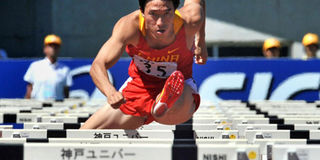China's Olympic winner Liu Xiang retires

Liu Xiang of China competes in the men's 110m hurdles qualifying session at the 2011 Asian Athletics Championships in Kobe on July 10, 2011. Liu Xiang announced his retirement April 4, 2015 saying he had "no choice" but to bring down the curtain on his trail-blazing career. PHOTO | KAZUHIRO NOGI |
What you need to know:
- The 31-year-old's retirement is likely to spark an outpouring of emotion from Chinese sports fans
- Liu suffered agonising exit at London 2012, clattering into the first hurdle in his opening heat.
- Liu's retirement follows China's first tennis Grand Slam winner Li Na calling it a day last year, and hugely-popular former NBA star Yao Ming signing off in 2011.
BEIJING
China's greatest track and field athlete Liu Xiang announced his retirement Tuesday, with the injury-plagued Athens 2004 gold medal winner saying he had "no choice" but to bring down the curtain on his trail-blazing career.
"From today, I will end my life as a professional athlete and retire formally," the 110m hurdles star said in an online post.
"This is a decision made after long deliberation. I am deeply reluctant and feel pained, but I have no choice," he added, on his verified account on Sina Weibo, China's version of Twitter.
The 31-year-old's retirement is likely to spark an outpouring of emotion from Chinese sports fans, despite the news being widely expected, particularly since reports last week that an announcement was imminent.
The Shanghai-born athlete has become loved for his heart-breaking setbacks as well as his achievements after he burst onto the scene in Athens to claim China's first men's track and field gold.
Following that victory, Liu was hotly tipped for gold at the 2008 Olympic Games in Beijing, but limped out of the first heat, shocking tearful home fans at the Birds Nest stadium.
Liu suffered another agonising exit at London 2012, clattering into the first hurdle in his opening heat. After being helped up, he hopped the length of the track before symbolically kissing the last barrier and exiting the Olympic arena.
Liu will be remembered in China as the man who proved that Asian athletes can compete with the world's best in sprint sports, particularly when he was on world-beating form ahead of Beijing 2008.
He arrived at the Games after breaking the world record with a time of 12.88 seconds in 2006, and winning the world title in 2007.
His coach Sun Haiping was quoted in Chinese media last week that he was "preparing" to retire, fuelling speculation at he would finally draw the curtain on a remarkable career.
In his retirement statement, Liu looked back with "reluctance" to the pivotal Beijing Olympics, when his career began to be severely affected by a right Achilles tendon injury.
"I dreamt about raising the (Chinese) flag," he said, "But the injuries started to torture me just before the race."
"Why did I let the Chinese people down?", he added.
PRIDE AND GLORY
His withdrawal in 2008 sparked widespread debate in China, with many observers accusing him at the time of letting his country down, while others said he had been pushed too hard by the country's strict state sports system.
But his pioneering exploits in athletics have been widely praised by many sports fans in China, and on Tuesday his retirement was the biggest topic on Weibo, with 11.5 million people re-posting the news within an hour of the announcement.
"You are the pride of China," one netizen said.
"Our national hero brought the Asian people glory," another added.
Liu's retirement follows China's first tennis Grand Slam winner Li Na calling it a day last year, and hugely-popular former NBA star Yao Ming signing off in 2011.
Many Chinese netizens compared the trio as they saluted Liu's achievements.
"China's three biggest sports stars have retired," one said. "Although this is sad, I look forward to more sports stars replacing them in the future."





